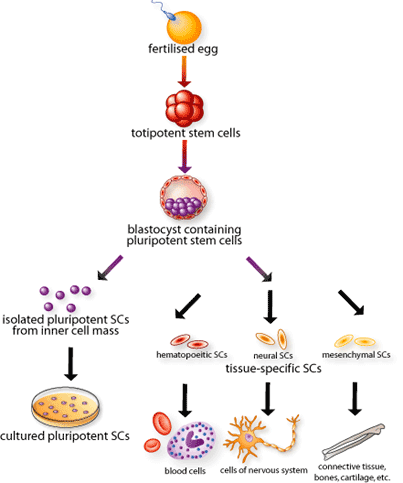Due to their abilities to become any type of cell the body needs, they can be used to cure virtually any ailment that has befallen humanity. In Japan, tests to cure heart diseases in mice using embryonic stem cells have returned positive results, and researchers are working on using the cells to cure heart diseases in humans. The cells can also cure paralysis in the human spine. Here's How:
If the spine has a crack or tear in it's tissue, as in the image below (please excuse the quality of my drawing), embryonic stem cells could be injected into the patient's back. Once they find their way to the the tear, they could transform themselves into the proper tissue cell needed to patch the tear. Researchers are currently experimenting on ways to guide the cells to the desired area in the body.
 Other diseases curable by stem cells include: diabetes, Parkinson's disease, lung diseases, liver failure, arthritis, and Alzheimer's disease.
Other diseases curable by stem cells include: diabetes, Parkinson's disease, lung diseases, liver failure, arthritis, and Alzheimer's disease.Cloning is also possible using stem cells, as the story of Dolly the sheep proves. Before Dolly, two sheep named Megan and Morag were cloned, but surprisingly, the public wasn't very interested in them. But a year later, Dolly became headline news everywhere when she was cloned using stem cells. Though she died relatively early, she proved that stem cells, with a little perfection, could be used to clone mammals. But, because Dolly was a clone of a six-year-old sheep, her DNA was older than her body, although nobody knew weather or not that contributed to her death.
The recent lift on the ban of funding stem cell research isn't leaving everyone happy. Some pro-life people disapprove of the extraction of embryonic stem cells, as doing so kills the embryo and potentially a human being before it can develop. The other side of the debate is that the life of one can be sacrificed to save many. Many believe that once researchers start killing embryos, it won't be long before they'll be used to killing newborns and young babies, and eventually children.
